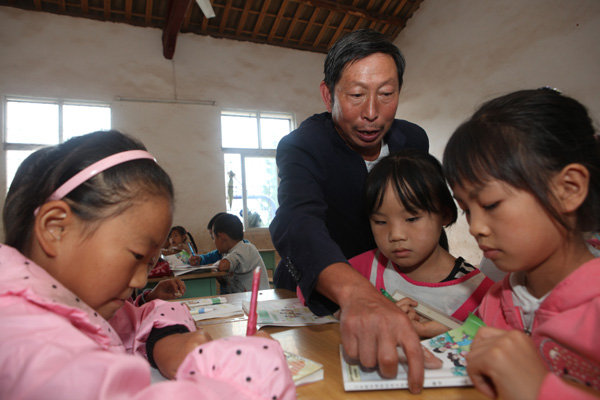Investing in rural teachers paying off
|
Xiong Gaoxiang, a teacher in Shanqingmiao, Sichuan province, instructs students in class. Xiong, 58, is one of only three teachers at the village school and has been teaching for more than 30 years. The government has been creating more benefits to keep teachers in the countryside. Lan Zitao / for China Daily |
When Tian Jigang, a math teacher, was transferred to work at the Mawangxi Primary School in Luxi county, Hunan province, in 2008, the meager salary and shabby dormitory the school offered made it hard for him to settle in the poor village.
Five years later, Tian feels proud of his decision to stay as his annual income has reached 50,000 yuan ($8,210), 14,400 yuan more than his colleagues working in the nearby town, according to a report released by the local education authority.
"Higher pay eased the pressure to make a living and gave us greater motivation to contribute to grassroots education in rural areas," Tian said.
Attracting qualified teachers to the countryside with better treatment has played an important role in reducing the gap in education resources between urban and rural areas, the Ministry of Education said on Tuesday.
Thanks to nationwide efforts to improve teachers' incomes and livelihoods in rural areas, more than 1 million teachers like Tian working in China's poverty-stricken regions receive extra benefits, according to the Ministry of Education.
"The fact that some rural schoolteachers can earn even higher salaries than those in urban schools is proof of the balanced allocation of education resources in China," said Xu Tao, director of the ministry's department of teachers' affairs.
"Closing the urban-rural gap (in teachers' incomes) has been a priority to ensure the quality of teaching teams in remote areas. It's also a sound implementation of the spirit of the Third Plenary Session to push education reform, especially education fairness," Xu said.
Government education expenditure reached 7.79 trillion yuan ($1.27 trillion) over the past five years, with an average annual increase of nearly 21.6 percent, according to the 2013 Government Work Report. The priority for educational resource allocation is rural, remote and poor ethnic areas, the report said.
In Jiangxi province, the provincial government added 150 million yuan this year to a special budget, reaching an annual sum of 300 million yuan for increasing rural schoolteachers' living allowances.
Each teacher working in remote mountainous villages now receives 360 yuan monthly, double the amount in 2012, in addition to their monthly wage, said Shi Rongrong, a provincial education committee official.
The ministry will reward respective education authorities with extra funds for their efforts to guarantee the improvement of teachers' livelihoods, Xu said.
The ministry also urges local authorities to further implement a rotation mechanism, which requires leaders of top-ranked urban schools to work at rural primary and secondary schools for a certain time to boost compulsory education at the grassroots level.
"Material support, such as teaching facilities, has become outdated. School-management expertise and advanced education philosophy have become more important," Xu said.
However, experts are concerned that enforcement of the measures could become a problem without accountability.
"Will school presidents and leading teachers abandon what they already achieved in the city to go serve in rural schools? I don't think it will work if no one from the local government gets punished for not pushing school leaders to rotate," said Xiong Bingqi, vice-president of the 21st Century Education Research Institute.
"The Party has been calling for years for the balancing of education resources, such as investing more in rural teachers' payments and pushing forward the school leader rotation system. But the effect is not as significant as expected. The central government should work more on supervision of its implementation."
Wang Ming, director of the elementary education office of the National Center of Education Development Research, suggested the central government create a special budget to support compulsory education in rural areas more directly.
"Isolated cases of decent pay for some teachers at village schools can't represent the situation in the vast rural and remote areas. The financial status of local governments differs a lot and areas in urgent need of financial aid are the majority," Wang said.
sunxiaochen@chinadaily.com.cn



















